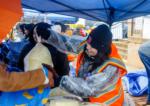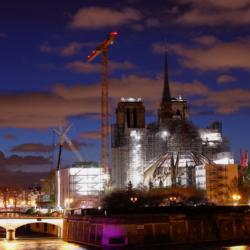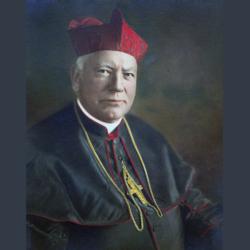Mass remembers lives lost in pregnancy and infancy
BRAINTREE -- Usually, when Msgr. Bryan Hehir celebrates a memorial Mass, he takes some time in his homily to reflect on the life of the deceased.
On the night of Nov. 20, however, this was not possible. That night, Msgr. Hehir, secretary of health and social services for the Archdiocese of Boston, celebrated a Mass of Remembrance and Healing for Pregnancy and Infant Loss in the Bethany Chapel of the archdiocese's Pastoral Center in Braintree. He was assisted by two seminarians from Pope St. John XXIII National Seminary in Weston.
About a dozen people attended the Mass, which for over 30 years has been sponsored by the Archdiocese of Boston Pro-Life Office and Project Rachel, an archdiocesan ministry for women and their partners who regret having an abortion.
In his homily, Msgr. Hehir noted that he could not share memories from lives as brief as the ones he was memorializing that night.
"Very early in the inception of life, and at the end of a long and fruitful life, death always has a dimension of loss," he said. "And yet, as Christian Catholics, when we face death, we speak of life."
He said that resurrection is at the core of their faith, not just in Christ's resurrection, but in the faithful's "subjective experience" of it.
"It is not simply a truth for us," he said. "The resurrection is an experience for us. The resurrection applies first to Christ, but from the moment of baptism, every Christian experiences, then, the risen life."
Regardless of how briefly a life may last on Earth, he said, all lives are "shaped by the hand of God" from conception until death.
"Tonight, we gather to remember those who have gone to God," he said, "and we gather to remember those who have suffered death in pregnancy and infant loss. As we gather this evening, our faith is affirmed. The memory of those we gathered to pray for is brought before the altar."
He added: "Each of us, in our own ways, can always remember the God who created us, the God who sustains us and sustains all of life, and the God who will be there for those who have suffered this heartbreaking loss in their lives."
After the homily, the Naming of Children ritual took place. In each booklet handed out at the Mass, there was a slip of paper with the following written on it: "In confidence and in hope, I acknowledge that my child(ren) is living in the infinite love of God. On this day, Nov. 20, 2024, joining with all the angels and saints, I entrust my child(ren) to the care of our heavenly father with love and by name."
The rest of the paper was a blank space for the names to be written in.
As Brahms's lullaby cooed from the organ, the assembly lined up to place their children's names in a basket before the altar. The assembly could also write their children's names in the Book of Remembrance after Mass.
Those who attend Masses of Remembrance are deliberately not asked about their circumstances. They are simply welcomed, accepted, and allowed to grieve.
"It's a very unique audience," Project Rachel Director Marianne Luthin told The Pilot. "Many are in deep pain for different kinds of reasons. Grief at the loss, and our culture doesn't recognize the loss."
Luthin said the abortion debate, with all its anger and politicization, has drowned out the women who are hurting.
"This is such a difficult and painful issue for many, but the church is there," she said. "Jesus is there to provide that hope and support."
The ministry's name comes from the biblical story of Rachel weeping for her children in exile, and God telling her: "Restrain your voice from weeping, and your eyes from tears."
"This Mass tonight is about that hope all Christians, all Catholics share," she said.
Older people who attend the Mass sometimes tell Luthin that they are there to remember siblings whose deaths in miscarriage were kept hidden.
"The Mass is there for them as well to be able to, because there was no funeral, to have a way of remembering," she said. "That's why we encourage people to write their name, put it in the book, so that child can be remembered as part of the communion of saints."
She has noticed that the culture surrounding miscarriage has changed dramatically in recent decades. In the past, women who had miscarriages would not discuss what happened or their grief. Sometimes, when they went to the hospital, they would never see their children's remains again.
"Thankfully, those days are gone," Luthin said, "and there's a recognition of the grief. It's very real. It's physical, it's emotional, it's spiritual."
Some of her family members have lost children under similar circumstances.
"Everybody wonders, how do you explain the mystery of life and death, particularly for the child before death who might have been very much wanted?" she said. "Or it could have been that someone made a decision to have an abortion, many times because they didn't see an alternative. There was no one to support them."
She called faith after the loss of a child "a double-edged sword." Women who have abortions may mistakenly believe that they have committed an unforgivable sin and do not deserve love or mercy.
"That's not what the church teaches," she said. "It's not what Jesus teaches. But I have been blessed to see the other end of that, when women who are in that kind of deep pain from abortion encounter the healing love of Christ. They are transformed. It's like a resurrection experience."
Other families respond to the loss by getting angry at God and accusing him of taking their child from them. Luthin pointed out how "David got pretty angry at God sometimes" in the Psalms. To her, it represents the relationship between humanity and God.
"You've got to work it through, but it's very understandable, right?" she said. "If you don't understand it in the context of faith, then it's really hard to put the pieces together. And that's why I think this Mass is so important, that we can see it in the life of faith, and the resurrection. I mean, that's what makes us Christian."



















